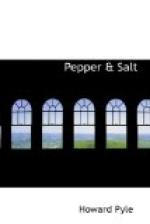“Done!” said Hans’s luck.
“Done!” said Hans.
Then he opened the mouth of the sack, and—puff! went his luck, like wind out of a bag, and—pop! it slipped into his breeches pocket.
He never saw it again with his mortal eyes, but it stayed near to him, I can tell you. “Ha! ha! ha!” it laughed in his pocket, “you have made an ill bargain, Hans, I can tell you!”
“Never mind,” said Hans, “I am contented.”
Hans Hecklemann did not tarry long in trying the new luck of his old plough, as you may easily guess. Off he went like the wind and borrowed Fritz Friedleburg’s old gray horse. Then he fastened the horse to the plough and struck the first furrow. When he had come to the end of it—pop! up shot a golden noble, as though some one had spun it up from the ground with his finger and thumb. Hans picked it up, and looked at it and looked at it as though he would swallow it with his eyes. Then he seized the handle of the plough and struck another furrow—pop! up went another golden noble, and Hans gathered it as he had done the other one. So he went on all of that day, striking furrows and gathering golden nobles until all of his pockets were as full as they could hold. When it was too dark to see to plough any more he took Fritz Friedleburg’s horse back home again, and then he went home himself.
All of his neighbors thought that he was crazy, for it was nothing but plough, plough, plough, morning and noon and night, spring and summer and autumn. Frost and darkness alone kept him from his labor. His stable was full of fine horses, and he worked them until they dropped in the furrows that he was always ploughing.
“Yes; Hans is crazy,” they all said; but when Hans heard them talk in this way he only winked to himself and went on with his ploughing, for he felt that he knew this from that.
But ill luck danced in his pocket with the golden nobles, and from the day that he closed his bargain with it he was an unhappy man. He had no comfort of living, for it was nothing but work, work, work. He was up and away at his ploughing at the first dawn of day, and he never came home till night had fallen; so, though he ploughed golden nobles, he did not turn up happiness in the furrows along with them. After he had eaten his supper he would sit silently behind the stove, warming his fingers and thinking of some quicker way of doing his ploughing. For it seemed to him that the gold-pieces came in very slowly, and he blamed himself that he had not asked his luck to let him turn up three at a time instead of only one at the end of each furrow; so he had no comfort in his gathering wealth. As day followed day he grew thin and haggard and worn, but seven boxes of bright new gold-pieces lay hidden in the cellar, of which nobody knew but himself. He told no one how rich he was growing, and all of his neighbors wondered why he did not starve to death.
So you see the ill luck in his breeches pocket had the best of the bargain, after all.




